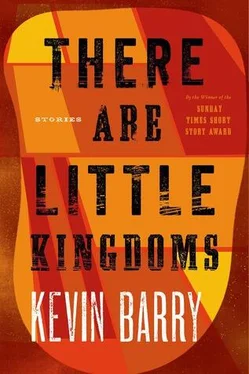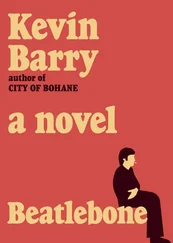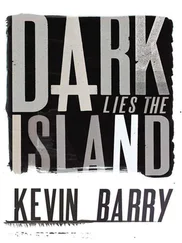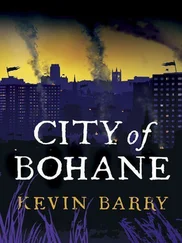Now it’s Heuston and here she comes. A thin girl in a pencil skirt, pulling a trolley-case behind, and the midday crush parts before her like a miraculous sea. She flips the key-guard of her phone and scrolls her texts. She moves on again, straight-backed and hard-eyed, with world-class invulnerability. She doesn’t know that every step from now will change her. She is so open, so fluid. Every conversation will change her, every chance meeting, every walk down the street. Every walk; every street.
How does a young fella born to a place of dismal fields and cold stone churches turn out to be fuck-off cool? How do you compute boreens and crows and dishwater skies and make it add up to a nineteen year old who walks into a party and every girl in the place goes loop-the-loop?
But not walks — walked. The party has been over for fifteen years. It was in Galway, a Saturday night, a Sunday morning, after the nightclubs had closed and the late roar of the streets had started to break up. A couple of dozen people — you’d say children, if you could see them now — went back, in pairs and in small groups, to a rented house. Most of them were still mashed on cheap nightclub drugs. The house had tongue-and-groove walls greening with damp and was filled with the smell of the damp and with the cloying waft of a low-grade cannabis resin. It was a little past four. The panes of the sash windows trembled with vibration from the music that was playing and the miserable furniture was pushed back to the walls. He went alone to a vantage corner. He hunched down on his heels and scoped out the ground. The girls wore lycra and had their hair styled in blunt retro fringes, like Jane Fonda in Barbarella. They wore clumpy shoes and tiny silver dresses, or flight jackets with heavy fur collars, they wore Lacoste, Fila and Le Coq Sportif. He sized them up, one by one, from ankles to nape, and he paid special attention to the tendons and the neck muscles; he was a canny young farmer at mart.
He made his decision, quickly and without fuss. He crossed the room towards where she was dancing and he said hi. She ignored him. He felt dry-mouthed, tense with concentration, excited. He would need to follow her eyes, carefully, and find the words that would lighten them. This was work. She was aloof and this had its magneticism and he may have begun to despair but he received a quick enquiring glance from over her shoulder and so was heartened. Gesture politics, in an old house, on a rough winter’s night, down a backstreet of Galway. There was water moving nearby, it wasn’t far from the Claddagh. She had a hindquarter on her it was unbelievable.
‘I saw you at Wiped, yeah?’
‘Yeah?’
‘Yeah. What was your name again?’
‘Martina.’
Two words were enough to give it away as a Clare accent, flat and somehow accusatory, an accent he didn’t approve of, normally, but she was good-looking enough to get away with it. His accent was from further north, and a shade east, pure Roscommon. It was designed for roaring over chainsaws and horsing out ballads to the fallen martyrs of Irish republicanism but he had honed it, somehow, to a hoarse-sounding, late-night cool.
Around them, all was nervousness and elation. Lit up like stars, everybody loved everybody, and there was little shyness about saying so. Hugs and love and tearful embraces. It was all tremendously fluffy. These were children born to unions of a pragmatism so dry it chaffed, they came from supper tables livid with silence, they came down from marriages where the L-word hadn’t darkened the door in decades. There was the feeling of sweat from the nightclub cooling on the small of your back.
He wore a number two cut, it was Daxed and brushed forward, and the sideburns were daily tended to. He by habit checked out people’s shoes: she was wearing Fila creepers, of which he approved. He owned three hundred and eighty-seven twelve-inch records, mostly made in Berlin, Sheffield or Detroit. He had a father with a head like a boiled ham.
‘It’s coming on in waves, like.’
‘Yeah,’ she said, ‘I know what you mean.’
Not by any stretch of the imagination could you say she had big tits but fine, really, at least not like your one out of the art college the other week, like an ironing board she was.
‘Waves,’ he said, and he chewed his jaws and rolled his shoulders.
The windows shuddered with bass and rattled with wind. There were the usual January gales off the Bay. It was one of those nights you’d be skinned walking down Spanish Arch, if you were heading for the taxis on Dominick Street. He weighed up his chances of getting her into a taxi and out the far end of Salthill. He lived in a bedsit there the size of a shoebox. He could make tea and toast without getting out of the bed. It was a row of old seaside boarding houses, mostly in disrepair. He could see down to the prom, to the low breaking waters and the power walkers in rain gear, their garish colours moving quickly through the rain. He sometimes followed random women on the prom. Yummy-mummies, coming out of Mass or the Centra: he walked at a reasonable distance behind, and was pleasantly hypnotised by the swaying quick switches of their rears. He almost always managed to control himself but sometimes they were very pale and beautiful. He scribbled down their car regs, just to mark the sighting, for no other purpose than that. He kept a list of regs and descriptions in a folder beneath his bed.
Only once had he become fevered. That was the day he followed the woman to her house on Taylor’s Hill. He had hauled up over the high wall and huddled in the wet garden behind her hedge. He peered into the kitchen — the light was on at three o’clock, it was such a dark afternoon — and he watched her boil a kettle for tea, the steam rising out of it, and the blood rushing in his ears. This was the most erotically-charged moment of October. He was on ketamine at the time.
‘Waves, like,’ he said. ‘I think I’m coming up on the third one now. I wouldn’t be surprised.’
She sensed something about him. When he looked at you, handsome and sharp-featured though he was, you got the feeling that comes after you’ve chewed a mouthful and you just know that the chicken is dodgy. She moved away from him. She went to her friend, Alice. She asked Alice if she knew him.
‘To see,’ said Alice. ‘Majorly cute. You must have seen him around the place. At Wiped and that. At Sex Kitchen?’
‘Yeah but why is he always on his own though?’
‘Maybe he’s just a bit quiet,’ said Alice.
Alice had a forgiving nature, especially when it came to men. She could find a good word to say about most anything in pants. She came from Tipperary and was the shape and texture of a kiwi fruit. She was so button-nosed you would think to press on it and hear a bell. She stood a jaunty five-nothing in her tallest heels. She was vivid, emotionally, and would make an opera out of the smallest crisis. She feared the routine and the humdrum. She sensed how easily these might overwhelm the paltry glamour available to a small wet college town in the west of Ireland. She was intuitive: she had an idea of the vast adult dullness that loomed around the next turn. She shook her head to be rid of the thought; tonight, she was hellbent on fun.
She drifted away from Martina, politely, still smiling. She loved her friend dearly but Martina was five ten and supple as a fawn: in the foreground perspective of a house party, the contrast-gain would not be Alice’s. She went to the kitchen, where there was a congregation too sophisticated to dance, or too smashed, or too shy. Alice’s gift was to immediately offer herself as an intimate and to be accepted as such. People let it all hang out when they talked to Alice. She enjoyed this but it could be a burden, too. She was left with little space for her own worries. Even her father had spilled to her, always, even when she was a kid, and with shit she didn’t need to hear. This had made her mother jealous, even though she couldn’t understand why. Theirs was the first divorce in Tipp after divorce came in.
Читать дальше












